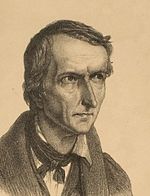Karl Salomo Zachariae von Lingenthal, Date of Birth, Place of Birth, Date of Death
TweetKarl Salomo Zachariae von Lingenthal
German juristAbout Karl Salomo Zachariae von Lingenthal
- Karl Salomo Zachariae von Lingenthal, (September 14, 1769 – March 27, 1843), German jurist, was born at Meissen in Saxony, the son of a lawyer and was the father of Karl Eduard Zachariae. Von Lingenthal received his early education at the famous public school of St.
- Afra in Meissen and later studied philosophy, history, mathematics and jurisprudence at the University of Leipzig.
- In 1792 he went to Wittenberg University as tutor to one of the counts of Lippe, and continued his legal studies. In 1794 he became Privatdozent, lecturing on Canon law, in 1798 extraordinary professor, and 1802 ordinary professor of feudal law. From that time to his death in 1843, with the exception of a short period in which public affairs occupied him, he poured out a succession of works covering the whole field of jurisprudence, and was a copious contributor to periodicals.
- In 1807 he received a call to Heidelberg, then beginning its period of splendour as a school of law.
- There, resisting many calls to Göttingen, Berlin and other universities, he remained until his death.
- In 1820 he took his seat, as representative of his university, in the upper house of the newly constituted parliament of Baden. Though he himself prepared many reforms - notably in the harsh criminal code - he was, by instinct and conviction, conservative and totally opposed to the violent democratic spirit which dominated the second chamber, and brought it into conflict with the grand-duke and the German federal government. After the remodelling of the constitution in a "reactionary" sense, he was returned, in 1825, by the district of Heidelberg to the second chamber, of which he became the first vice-president, and in which he proved himself more "loyal" than the government itself.
- With the growth of parliamentary Liberalism, however, he grew disgusted with politics, from which he retired altogether in 1829.
- He then devoted himself wholly to juridical work and to the last days of his life toiled with the ardour of a young student.
Read more at Wikipedia
See Also
- Famous People's Birthdays on 14 September, Germany
- Famous People's Birthdays in September, Germany
- Famous jurist's Birthdays on 14 September, Germany
- Famous jurist's Birthdays in September, Germany
- Famous university teacher's Birthdays on 14 September, Germany
- Famous university teacher's Birthdays in September, Germany


 Date of Birth:
Date of Birth:  Place of Birth: Meissen, Saxony, Germany
Place of Birth: Meissen, Saxony, Germany